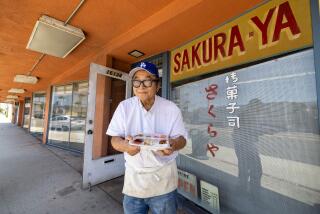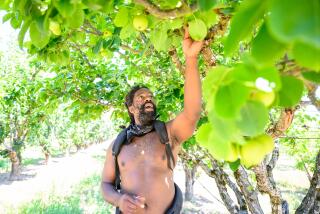NONFICTION - June 11, 1995
- Share via
EPITAPH FOR A PEACH: Four Seasons on My Family Farm by David Mas Masumoto. (HarperCollins: $20; 233 pp.) It’s hard to imagine any food, any fruit more sensual than the peach, and Masumoto, fourth generation peach farmer near Del Rey, California, has here written a chronicle of the craft that awakens all the senses. And while Zen is hardly mentioned, it has been said that wakening the senses is one of the side effects of that religion. What a gentle voice! This book began years ago when Masumoto wrote a story for the Los Angeles Times about his sad plan to bulldoze the orchard his father planted 20 years ago of Sun Crest peaches, a variety that “tastes like a peach is supposed to . . . the flesh is so juicy that it oozes down your chin. The nectar explodes in your mouth and the fragrance enchants your nose, a natural perfume that can never be captured.”
Several features have made these peaches increasingly less “marketable”: they turn gold, rather than the “lipstick red” the public likes, stricter quality standards mean that varieties such as Sun Crest, with no shelf life, varieties that can’t be stored for weeks on end, don’t pass inspections. Sounds like the tomatoes we buy these days. Sounds like a lot of things. Anyway, this book is the story of the year in which Masumoto, convinced by the torrential response to his story not to bulldoze his Sun Crest orchard, tried to make it work. And he takes the hard way: rather than synthetic fertilizers, he uses, among other things, cover crops like crimson clover, common vetches, beans and barley to add nutrients to his soil, despite the fact that they involve so much more work. He plants wildflowers, and between the cover crops and the flowers the farm stays green all year-round. Rather than using herbicides, he allows the weeds (“wild grasses”) to live their natural lives, preferring them to fields made sterile by herbicides.
Masumoto is a third-generation Japanese-American farmer, his family is from Kumamoto, “Rice farmers with not even a hint of samurai blood.” As he watches his 8-year-old daughter tend her own small garden, he remembers how, from his own father, he learned to fail. And he writes with some fear but more courage about learning to live with a farmer’s ultimate lack of control over his livelihood: “I feel persecuted by the power of mother nature, who dwarfs my farm with her unpredictable character. Yet I cling to a spirit of survival. I observe others, my family and neighbors, as we brace for the storm with a humbling humility.” He describes watching two old Japanese workers pruning pine trees: “The two old men worked in silence . . . pulling off needles and shaping the tree. The pine was not an eighty-year-old bonsai masterpiece . . . but they kept probing the bottom of each limb, stopping at a small outgrowth and quickly snapping it off. Their fingers gently raked the branches . . . their glassy old eyes wandered across the needles. . . . ‘How do you know what to cut?’ I asked. One glanced up and smiled softly . . . a smile was familiar to that face.”
“Dewdrops trickling down barren branches,” “an arctic blast” that moves into the valley like a “silent wolf,” this is language that feels like a breeze, or like fog on your skin. It smells like damp earth. And as for the work, it is, as Masumoto describes, “work that is inseparable from home.”
More to Read
Sign up for our Book Club newsletter
Get the latest news, events and more from the Los Angeles Times Book Club, and help us get L.A. reading and talking.
You may occasionally receive promotional content from the Los Angeles Times.










